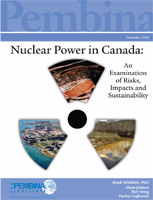
News |
- Nunavut Land Claim Agreement to Court
- US Polar Bears Threatened
- Right to Hunt at Night Won
- If You Were Prime Minister Tour
- Chemicals Impair Kids' Brain Development
- Exxon To Only Pay Half Damages
- Canadian Nuclear Industry Ads Inquiry?
- 2006 Word of the Year: 'Carbon Neutral'
- Budget Cuts To Cripple EPA Libraries
- Pressure on Ontario for Climate Change Plan
- Liberal Leader Supports Traditional Lands Protection
- Government Censoring Lake Winnipeg Report?
| Nunavut Land Claim Agreement to Court | 31 January 07 |
 Nunavut Tunngavik Inc. (NTI) launched a $1 billion lawsuit against Canada's federal government, alleging Ottawa has violated the Nunavut land claim agreement by failing to carry out its implementation responsibilities. Nunavut Tunngavik Inc. (NTI) launched a $1 billion lawsuit against Canada's federal government, alleging Ottawa has violated the Nunavut land claim agreement by failing to carry out its implementation responsibilities. NTI's statement of claim, filed in Nunavut Court of Justice on December 5, 2006, alleges 16 breaches of the land-claims agreement. The suit alleges the Inuit lose $123 million a year in wages and benefits because too many federal jobs go to workers from the south, despite guarantees in the agreement that a representative portion would go to northerners (Inuit make up 85% of the territory's population). The claim says there has not been adequate funding for the planning commission and the water board. "The government said they would fund implementation matters and they have not." Although the dispute stretches back years, the situation has deteriorated under Canada's new government, said NTI head Paul Kaludjak. "We're at an impasse. Nothing is happening with this new government." As relief, NTI wants the court to order the federal government to pay court costs, punitive damages, plus a billion dollars in compensation. Earlier, B.C. Judge Thomas Berger, hired to look at the Inuit land claim and its implementation, released a report with a number of recommendations, including a recommendation for the allocation of an extra $20 million a year and revamped schools with a bilingual English-Inuktitut curriculum. View the December 8, 2006 Nunatsiaq News article View the December 7, 2006 CBC article View the December 6, 2006 Canadian Press article on CNews View the March 2006, Judge Thomas Berger, Conciliator's Final Report: The Nunavut Project (PDF) Sources: Nunatsiaq News, CBC, Canadian Press
|
|
| US Polar Bears Threatened | 25 January 07 |
 In December 2006, the US government took its first steps toward listing the polar bear as a threatened species after admitting that climate change may be putting the species' survival at risk. In December 2006, the US government took its first steps toward listing the polar bear as a threatened species after admitting that climate change may be putting the species' survival at risk.The action by the US Fish and Wildlife Service, which had been sued by environmental groups, starts a period of public comment and scientific review before a final decision in 12 months over whether to list the polar bear as threatened. The only wild polar bears in the United States live in Alaska. "Global warming is the single biggest threat to polar bears' survival, and this will require the government to address the impacts on the polar bear," said Andrew Wetzler, a senior attorney with Natural Resources Defense Council, one of the groups that sued the government seeking action to protect the polar bear. View the December 27, 2006 Reuters article View the December 28, 2006 Reuters article on Planet Ark View the December 28, 2006 InTheNews.co.uk article View previous Manitoba Wildlands news items: September 22, 2006 & February 6, 2006 Sources: Reuters, inthenews.co.uk
|
|
| Right to Hunt at Night Won | 25 January 07 |
 The Supreme Court of Canada has ruled that two Aboriginal men from British Columbia can hunt deer at night. The Supreme Court of Canada has ruled that two Aboriginal men from British Columbia can hunt deer at night.Ivan Morris and Carl Olsen, members of the Tsartlip First Nation of Vancouver Island, had been convicted by the BC provincial court of hunting at night by flashlight, a practice that is illegal under B.C.'s Wildlife Act. The ruling had been upheld by a court of appeal, but the Supreme Court, in a 4-3 decision, overturned the convictions, saying that the men's treaty rights, in this case, prevail over provincial law. The three dissenting judges argued that night hunting is dangerous and the right to hunt unsafely is not protected by the treaty. Drawing upon historical information, the Supreme Court said a treaty signed in 1852 allows the Tsartlip to hunt using traditional methods. Originally, the Tsartlip people would have used torchlight, bows and arrows, but their equipment must be allowed to evolve, the judges said. A BC law professor said the judgment is significant at a broader level. "It shows that treaties can be paramount to provincial law," said John Borrows of the University of Victoria. View the December 21, 2006 CBC article View the December 21, 2006 First Perspective article View the December 21, 2006 Supreme Court of Canada Decision Sources: CBC, First Perspective
|
|
| If You Were Prime Minister Tour | 24 January 07 |
 Starting on February 1, 2007, David Suzuki is traveling across Canada on the "If you were Prime Minister..." tour. This 50-city tour is the biggest of his career. Starting on February 1, 2007, David Suzuki is traveling across Canada on the "If you were Prime Minister..." tour. This 50-city tour is the biggest of his career. David Suzuki is coming to Winnipeg to find out what you think we need to do for the environment. He'll take your ideas to Ottawa to make sure your voice is heard. Manitoba Wildlands is hosting the Winnipeg event on February 20, 2007 at the Burton Cummings Theatre at 7:30 PM, Tickets are $9 each plus TicketMaster charges and a $1 Burton Cummings Theatre renovation fee. Tickets are available Thursday, January 25 Online at ticketmaster.ca, Charge-by-phone at 780-3333, and at all TicketMaster Ticket Centres. Come see David Suzuki and cast your vote for the environment. View David Suzuki's YouTube video and submit your own suggestions Listen to COOL IT The Global Cooling Song by Raffi and the David Suzuki Foundation Listen to David Suzuki's audio advertisement (MP3) Tour dates across Canada: Newfoundland-Nova Scotia-Prince Edward Island-New Brunswick Quebec-Ontario-Manitoba Saskatchewan-Alberta-British Columbia View the January 30, 2007 Globe and Mail article Source: David Suzuki Foundation
|
|
| Chemicals Impair Kids' Brain Development | 23 January 07 |
 Industrial chemicals are impairing the brain development of children, knocking down IQs, shortening attention spans and triggering behaviour problems, according to a November 2006 report published in the medical journal The Lancet that calls for better regulation of 201 chemicals with neurotoxic effects. Industrial chemicals are impairing the brain development of children, knocking down IQs, shortening attention spans and triggering behaviour problems, according to a November 2006 report published in the medical journal The Lancet that calls for better regulation of 201 chemicals with neurotoxic effects.The report authors, led by Dr. Philippe Grandjean, adjunct professor at Harvard School of Public Health, conclude that industrial chemicals are responsible for what they call a silent pandemic that has caused impaired brain development in millions of children worldwide. Fetal and early childhood exposures to industrial chemicals in the environment can damage the developing brain and can lead to neurodevelopmental disorders (NDDs)-autism, attention deficit disorder (ADHD), and mental retardation. One out of every six children has a developmental disability, usually involving the nervous system. To protect children against industrial chemicals that can injure the developing brain, the researchers urge a precautionary approach for chemical testing and control, involving strong regulation. Most systems currently require a high level of proof in order to impose regulation. View the November 7, 2006 Harvard School of Public Health press release View the November 8, 2006 Vancouver Sun article on Canada.com View Potentials for exposure to industrial chemicals suspected of causing developmental neurotoxicity, and appendix to the November 8, 2006 article published in the Lancet, Developmental neurotoxicity of industrial chemicals - A silent pandemic (DOC) Sources: Harvard School of Public Health, Vancouver Sun
|
|
| Exxon To Only Pay Half Damages | 19 January 07 |
 A US court has reduced by almost half the payment in damages oil giant Exxon Mobil must pay for the 1989 Exxon Valdez oil spill off Alaska. The San Francisco Federal appeals court reduced the payment from US$4.5 billion to US$2.5 billion, saying the previous decision had been excessive. A US court has reduced by almost half the payment in damages oil giant Exxon Mobil must pay for the 1989 Exxon Valdez oil spill off Alaska. The San Francisco Federal appeals court reduced the payment from US$4.5 billion to US$2.5 billion, saying the previous decision had been excessive. In the original court ruling, Exxon was ordered to pay out $5 billion. It is the third time damages in the case have been reduced. The case, initiated in 1994 by more than 32,000 fishermen, native Alaskans and property owners - is one of the longest non-criminal cases in US history. The Exxon Valdez supertanker spilled 11 million gallons of crude oil into Prince William Sound, polluting around 2,000km of coastline. Its captain, Joseph Hazelwood, admitted drinking vodka before boarding the vessel, but was acquitted of operating a ship while intoxicated. The disaster is estimated to have killed 250,000 seabirds, 2,800 sea otters, 300 harbour seals, 250 bald eagles, up to 22 killer whales, and an unknown number of salmon and herring. View the December 22, 2006 BBC News article Source: BBC News
|
|
| Canadian Nuclear Industry Ads Inquiry? | 19 January 07 |
 Religious, public health, renewable energy and environmental groups from across Canada have filed an application that could launch an inquiry by Canada's Competition Bureau into the Canadian Nuclear Association's (CNA) high profile advertising campaign touting the benefits of nuclear power. The applicants allege that claims made in a series of high-profile television, radio and print ads are misleading. Religious, public health, renewable energy and environmental groups from across Canada have filed an application that could launch an inquiry by Canada's Competition Bureau into the Canadian Nuclear Association's (CNA) high profile advertising campaign touting the benefits of nuclear power. The applicants allege that claims made in a series of high-profile television, radio and print ads are misleading.The CNA adverting campaign states, against a background of blue sky, that nuclear power is "clean", "reliable" and "affordable," and that nuclear power generation "does not create greenhouse gases," "keeps the air clean" and is subject to "stable" fuel prices. The application asks the Competition Commissioner to investigate whether these representations are factually correct and weather they create a misleading impression of the environmental impacts and economic costs associated with nuclear power. The application was filed by Sierra Legal on behalf of the Pembina Institute, WWF-Canada, Ontario Sustainable Energy Association, Sky Generation Inc., Interchurch Uranium Committee Educational Cooperative, Canadian Association of Physicians for the Environment, and Families Against Radiation Exposure (FARE). View the December 19, 2006 Sierra Legal defense Fund press release View the December 18, 2006 Sierra Legal Defense Fund application to Canada's Competition Bureau for an inquiry into the Canadian Nuclear Association's (CNA) advertising campaign (PDF) View the December 2006 Pembina Institute publication, Nuclear Power in Canada: An Examination of Risks, Impacts and Sustainability (PDF) Source: Sierra Legal Defense Fund
|
|
| 2006 Word of the Year: 'Carbon Neutral' | 19 January 07 |
 The New Oxford American Dictionary's Word of the Year for 2006 is 'carbon neutral'. Announced in November 2006, recognition of the term 'carbon neutral' reflects the growing importance of the environmental movement and concerns about global warming in the United States. The New Oxford American Dictionary's Word of the Year for 2006 is 'carbon neutral'. Announced in November 2006, recognition of the term 'carbon neutral' reflects the growing importance of the environmental movement and concerns about global warming in the United States.Erin McKean, editor in chief of the New Oxford American Dictionary, said "The increasing use of the word 'carbon neutral' reflects not just the greening of our culture, but the greening of our language. When you see first graders trying to make their classrooms carbon neutral, you know the word has become mainstream." The concept of carbon neutral is all about understanding the environmental impact that carbon emitting actions have on the earth, and finding a way to reduce that impact, or at least balance it out. Common activities like driving, flying and purchasing imported goods release tonnes of greenhouse gas into the air and are some of the biggest contributors to the increase in greenhouse gas. View the November 13, 2006 Oxford University Press Blog, Carbon Neutral: Oxford Word of the Year View commentary on the 2006 Oxford University Press Word of the Year on De Smog Blog Sources: Oxford University Press Blog, De Smog Blog
|
|
| Budget Cuts To Cripple EPA Libraries | 16 January 07 |
 In 1970, during the first wave of environmentalism, the US White House and Congress established the Environmental Protection Agency in response to the growing public demand for cleaner water, air and land. The EPA has been a primary source of environmental information for the public, students, researchers and scientists. In 1970, during the first wave of environmentalism, the US White House and Congress established the Environmental Protection Agency in response to the growing public demand for cleaner water, air and land. The EPA has been a primary source of environmental information for the public, students, researchers and scientists.The Bush administration is seeking to cut $2 million from the EPA library budget. This move would force the closure of many of the regional libraries. Cuts would also leave the EPA Online Library System (OLS) with a virtually nonexistent ability to maintain its current level of access. The EPA libraries in Washington D.C., Chicago and Kansas City have already been closed. The EPA indicates it is premature to consider mass closings of its libraries and that libraries attached to federal buildings would be unaffected. "They are moving ahead very quickly on very substantive cuts to their library program," said Patrice McDermott, deputy director of the American Library Association's Office of Government Relations. "They really don't have a good plan for continuing to provide access for the public, and even their own researchers and scientists, to the information." View the May 15, 2006 Washington Post article View the February 15, 2006 Librarian.net Blog entry View the December 27, 2006 Human Race Blog entry Sources: Washington Post, Librarian.net, Human Race
|
|
| Pressure on Ontario for Climate Change Plan | 16 January 07 |
 Greenpeace is urging the Ontario government to devise a climate change plan that includes hard caps on greenhouse gas emissions and short, medium and long term targets for emissions reductions. Meanwhile, the NDP has introduced a private members bill that would ensure Ontario adheres to Kyoto commitments. Greenpeace is urging the Ontario government to devise a climate change plan that includes hard caps on greenhouse gas emissions and short, medium and long term targets for emissions reductions. Meanwhile, the NDP has introduced a private members bill that would ensure Ontario adheres to Kyoto commitments.In November 2006, the Ontario government quietly undertook a series of consultations on "Ontario's Climate Change and Clean Air Plan". According to a December 8, 2006 letter from Greenpeace to Premier McGuinty, the "Ministry of Environment consultation meetings lacked adequate notice and preparation time; and provided no draft proposal or background material." On December 19, 2006, Ontario NDP Environment Critic Peter Tabuns introduced the Ontario Greenhouse Gas Emissions Reduction Act, which among other things, would require Executive Council to ensure that greenhouse gas emissions are reduced to no less than six percent below their 1990 level by 2012 and to no less than 25 percent below their 1990 level by 2020. It also requires the Minister of the Environment to prepare a plan for the reduction of greenhouse gases in Ontario that includes a strategy to meet greenhouse gas emissions targets for every year from 2008 to 2020. View the December 8, 2006 letter from Greenpeace to Ontario Premier Dalton McGuinty (PDF) View the December 2006 Greenpeace document, Ontario's Climate Crisis: The Time to Act is Now (PDF) View Bill 179 2006, the Ontario Greenhouse Gas Emissions Reduction Act Sources: Greenpeace, Government of Ontario
|
|
| Liberal Leader Supports Traditional Lands Protection | 11 January 07 |
 Manitoba Liberal Party Leader John Gerrard has added his voice to a growing list of individuals and groups that publicly support Poplar River First Nation's efforts to secure permanent legal protection for the Poplar/Nanowin Rivers Protected Area. Manitoba Liberal Party Leader John Gerrard has added his voice to a growing list of individuals and groups that publicly support Poplar River First Nation's efforts to secure permanent legal protection for the Poplar/Nanowin Rivers Protected Area.In his January 5, 2007 letter, Mr. Gerrard congratulates Poplar River for its commitment to lands stewardship and for completion of the Asatiwisipe Aki Lands Management Plan. Gerrard also acknowledges Poplar River's work on the nomination process to seek World Heritage Site (WHS) status for lands on the east side of Manitoba and into Ontario that encompass Poplar River's traditional lands with the traditional lands of neighboring First Nations. The Manitoba Liberals were also the first political party to publicly declare support for establishment of the WHS, as proposed by the Manitoba and Ontario First Nations in 2004. View January 5, 2007 letter from Manitoba Liberal Leader, John Gerrard (PDF) View November 16, 2004 Manitoba Liberal Party press release (DOC) Visit the Poplar River First Nation website View previous Manitoba Wildlands news items: November 21, 2006 - Poplar/Nanowin River Protection Urgent May 24, 2006 - Poplar River Launches Plan, Seeks Protection January 26, 2006 - NRDC Issues Boreal BioGem Alert January 19, 2006 - Asatiwisipe Aki Releases Lands Plan Source: Liberal Party of Manitoba
|
|
| Government Censoring Lake Winnipeg Report? | 11 January 07 |
 The Grand Chief of the Southern Chiefs Organization accused the NDP government of censoring Lake Winnipeg Stewardship Board reports and "watering down" its recommendations. The Grand Chief of the Southern Chiefs Organization accused the NDP government of censoring Lake Winnipeg Stewardship Board reports and "watering down" its recommendations.Grand Chief Chris Henderson claimed the province is preventing the water-quality experts who've been charged with the task of cleaning up Lake Winnipeg from suggesting more aggressive means of saving the nutrient-polluted lake. A spokeswoman for Water Stewardship Minister Christine Melnick would not comment on Henderson's censorship allegations. According to Grand Chief Henderson, "There has to be a lot more openness and honesty about identifying the real culprits (responsible for polluting) Lake Winnipeg." Former Manitoba Deputy Minister of Conservation and Water Stewardship, Norm Brandson also spoke critically of the government's plan to regulate phosphorus (the prime culprit in the lake's eutrophication), stating that the targets are so high they are meaningless. Brandson was provincial co-chair of the 2005 Lake Winnipeg Implementation Committee, a joint federal-provincial task force charged with, as the title of its report states, Restoring the Health of Lake Winnipeg. View the December 22, 2006 Winnipeg Free Press article (DOC) View the December 20, 2006 Winnipeg Free Press article (DOC) Source: Winnipeg Free Press
|
|


 RSS Feeds:
RSS Feeds: